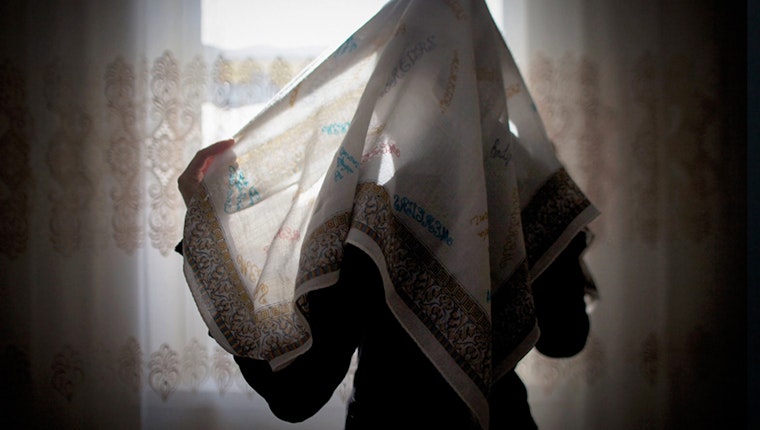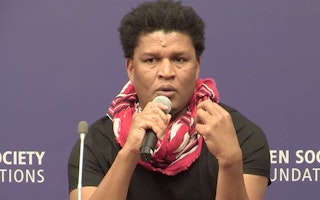For Chechen Women, Modesty is the New Normal
By Yukiko Yamagata

Photographer Diana Markosian traveled to Chechnya in 2011 to explore what it means to come of age as a young woman living under an increasingly repressive regime after President Ramzan Kadyrov took power in 2007. She discusses the resulting project—Goodbye, My Chechnya—in the video above. I recently connected with Markosian to learn more, and to hear what the current environment for women is like today, three years after this project began.
What most surprised you about your time in Chechnya and getting to know these young women?
This story was very personal to me. I never expected the Chechen people to welcome me into their lives the way they did. It’s the closest thing to home I’ve ever known.
As a photographer, it’s challenging to visually express an experience like this. I became emotionally connected to these young women in a way that goes beyond the parameters of a story. I was most surprised by the way in which the Chechen women were able to maintain their humanity and grace, given the atrocities that have taken place.
I find the notion of choice particularly interesting in your story. Official decrees monitoring behavior and dress are forced upon Chechen women, but at the same time, some young women embrace this new culture of modesty, at times more so than their parents’ generation. Can you talk about that a bit more? How are these decrees being promoted and normalized among young women?
Chechen culture has always upheld modesty. But in recent years, the government has reverted to deeply traditional values as President Kadyrov seeks to become, as local activists put it, “more Islamic than Islamists.”
Females are required to cover their heads in public and will not be permitted to study at State University unless they wear dresses. This dress code for women is part of a wider government campaign launched a few years back to promote “morality and revival of national traditions,” according to President Kadyrov.
Celebrities were among the first to conform, making the headscarf a fashion statement. I noticed the younger generation was influenced by this, as many of the girls who I photographed embraced an even stricter form of Islam by wearing a hijab, a headscarf that covers both the head and neck. This was a sharp break from their parents’ tradition and the Chechen culture, but something the government is now promoting.
And what about those who break the rules or rebel? Honor killings are one of the more extreme examples of punishment, but what are other ways these official decrees are enforced? And who is doing the enforcing?
Former Chechen rebels loyal to Kadyrov [known as “kadyrovtsy”] were suspected of driving around in cars with no license plates, shooting paintballs at women who weren’t wearing headscarves. The Chechen government and authorities enforce the dress code. Whatever Kadyrov says will be carried out.
In downtown Grozny, several businesses were ordered to cover up the bare heads of women in their advertisements. Authorities walked around the area, ripping off ads with women pictured in them or plastering red tape over their bare heads.
As you mention, Kadyrov also supports honor killings of those who violate or disregard the new law. After the bodies of seven women were found by the side of a road two years ago, he publicly stated, “If a woman runs around and if a man runs around with her, both of them are killed,” commenting that they probably had “loose morals.”
You made this work in 2011–2012. What is the current climate like for young women in Chechnya?
I’m currently back in the region working on a personal project and teaching a photography workshop to young girls. Life is returning to the streets of Grozny and the once war-torn city is emerging from the rubble. Theater openings and packed restaurants denote there is a rebirth in an emerging middle class.
The capital is the central point of this reconstruction, where years of violence can hardly be seen. Most if not all roadblocks have been removed. The city now has a five-star hotel and shopping center with designer outlets. The Chechen people, too, seem less paranoid, now traveling overseas to places like Turkey and Dubai.
The years I worked in Chechnya seemed to be transition years as the government was building mosques, ordering girls to cover themselves up, and imposing strict Islamic practices. This has now become the norm. Many I spoke with who once questioned such rituals now don’t, and abide by the dress code as an expression of pride in their faith and culture.
The video above is part of a series of interviews with photographers featured in Moving Walls 21. Moving Walls is an annual exhibit produced by the Open Society Documentary Photography Project.

Until December 2021, Yukiko Yamagata was curatorial and deputy director of Culture and Art at the Open Society Foundations.


